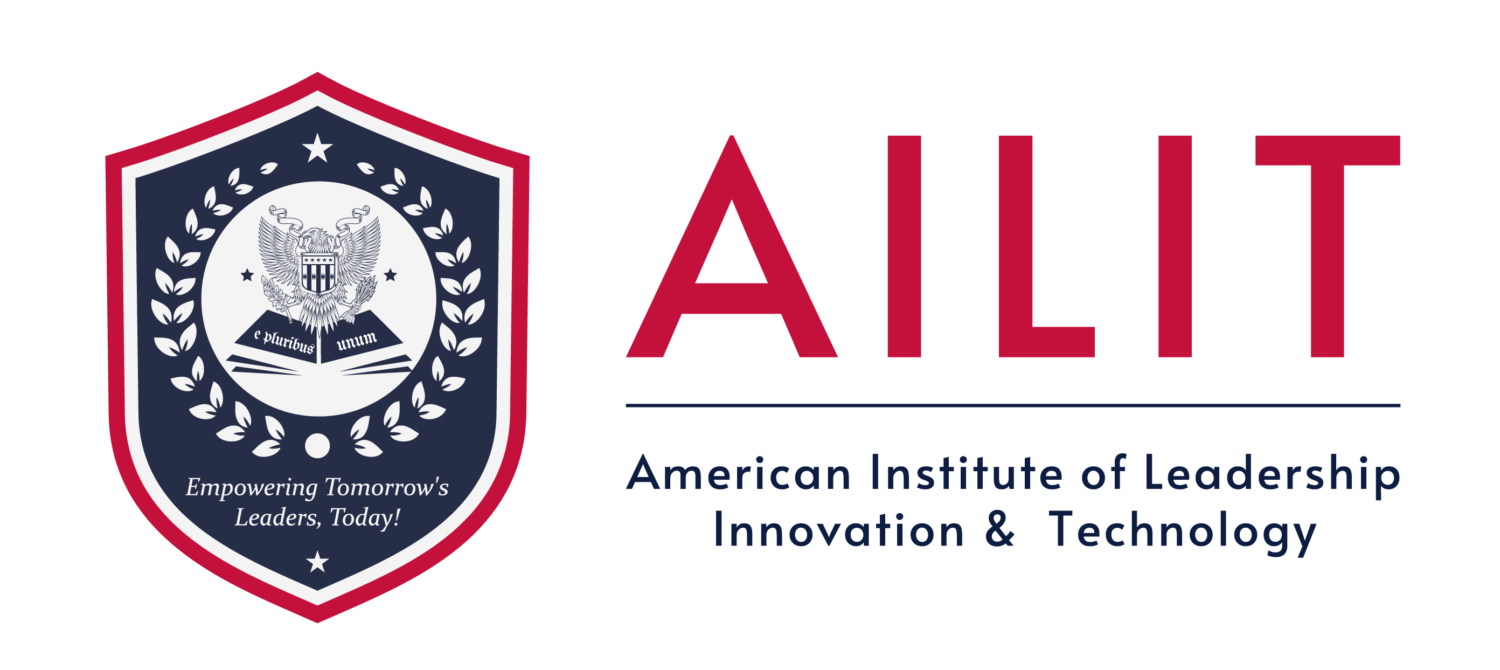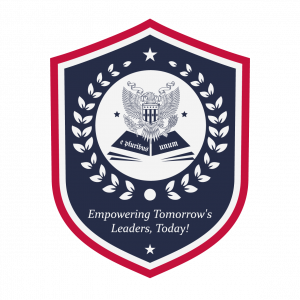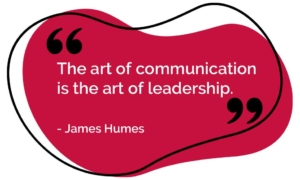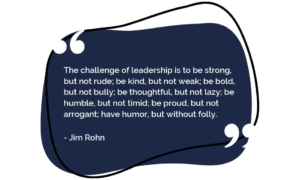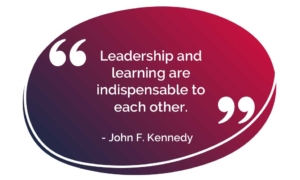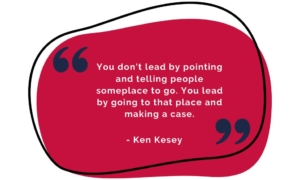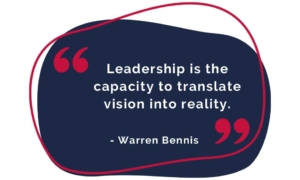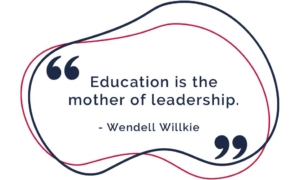Warren Bennis, the father of leadership studies, famously said that the most dangerous leadership myth is that executive leaders are born and that there is a genetic factor to leadership.
That’s nonsense, he argued.
In fact, the opposite is true. Leaders are made rather than born, Bennis proclaimed.
And his words still echo in our modern times – in leadership studies, motivational quotes, and speeches of the executives themselves.
The recent findings seem to cement this line of thought with firm evidence. Over 40% of Fortune’s 100 CEOs had MBA, while nearly half previously served as divisional CFOs.
In other words, executives who lead the most successful companies in the world climbed their way to the top while working hard on self-development.
Here’s what skills, competencies, and strengths they all nurtured. Consider them as a to-do list for every aspiring executive.
#1 Communication Skills
By definition, an executive leader is a person who runs the organization by influencing and guiding its workforce and managing resources. In practice, the job includes many roles and responsibilities: representing the company, being responsible for its overall performance, making strategic decisions, etc.
In a word, the role of an executive leader has a lot to do with communication.
Good leaders need to be able to present decisions, convey ideas, and share plans. On a daily basis, they must delegate the work of others by making clear and concise points.
But at the end of the day, the best leaders communicate by listening. Only then are they able to recognize an organization’s inner potential, develop appropriate strategies, and gain a bird’ eye view of its functioning.
Bonus Tip
Like every skill, communication is perfected only through practice. No one can communicate with walls.
Practice active listening first. Engage with what people are saying, ask follow-up questions, and give affirmative responses. Control your emotions to prevent misunderstandings and hasty replies.
To upgrade your communication skills, develop your personal templates for different situations – visualize a scenario and stick to it. Be mindful of your body language: maintain eye contact, limit hand gestures, and set your posture.
Last but not least, seize every opportunity to practice public speaking – it’s an essential skill every leader should master.
#2 Develop Emotional Intelligence
As many successful CEOs testified, having business acumen is just one piece of the puzzle. Norman Schwarzkopf, for instance, defined leadership as a potent combination of strategy and character, claiming that – if you have to choose one of them – you should always opt for the character.
Because multiple leadership roles all eventually come down to working with people and nurturing relationships, you must know the ins and outs of human psychology. Empathy is one of the most critical strengths on your way to the top. A true leader should understand what motivates the employees, what drives their work, and what enhances their productivity.
But being emotionally intelligent is not just about possessing insight into others. It’s about controlling and balancing your own emotions, recognizing weaknesses, and accenting your strengths. In a word, a leader who leads people must first become a master of his inner empire.
Bonus Tip
Even though it may sound like emotional intelligence is something we’re born with, EQ skills can also be perfected intentionally. As a matter of fact, active listening and assertive communication is an excellent way to exercise empathy – the backbone of an emotionally intelligent person.
Furthermore, learn how to listen to yourself. Self-awareness is crucial if you want to become a good leader: perceive your inner shifts, learn what motivates you, and develop personal mechanisms for maintaining psychological well-being.
#3 Become a Tireless Learner
It only seems logical: if you want to lead an organization’s development, you must work on your personal development. Among many other executive leadership skills, learning through experience could be the very essence of their distinctness. It’s the way of turning your everyday life into the quantum of knowledge.
Eventually, being an ongoing learner means avoiding mistakes, sharpening your skills, and deepening your perception. In pragmatic terms, it means developing qualities that are essential for executive jobs.
Bonus Tip
Besides gaining academic credentials, finding a mentor is an excellent way of learning leadership skills. Think who your role models are and choose the one you can ask for help. This kind of apprenticeship means shadowing your ideal leader and picking up actionable knowledge. Don’t be distracted by position details or salary – sharpen your focus on learning. Other benefits will only come with quality.
#4 Be Prepared to Set an Example
The primary role of a good leader is to set an example for his followers. It’s one of those scalable evergreen pearls of wisdom that remain true no matter the particular leadership situation. Humans are herd-gathering species, and it’s in our nature to follow the head to survive.
Even if you’re in charge of just a small sales team – expect they will look up to you and only do what they’ve seen you do.
If you want the employees to be punctual, be on time yourself. Don’t simply preach values – be their embodiment. Set business standards by living them. Breed organizational culture by growing it within yourself. Vice versa, expect your mistakes and recklessness to be multiplied a thousand times, possibly progressively, down the corporate ladder.
Bonus Tip
Remember that even the head of a herd is still its member. It’s never a good idea for a leader to separate too much from his followers.
To translate this into real situations, think in terms of “We,” not “I” on a daily basis. Build a community and togetherness, not a competitive surrounding where enemies bite each other.
Of course, be cautious not to overdo it. The role of a good leader is to nurture a holistic approach and precisely estimate what relations are beneficial to the organization’s well-being.
#5 Translating Visions Into Strategies
The ablest of leaders are those who’ve found and maintained the fragile balance between visions and pragmatic strategies. For an organization to progress forward, it needs practical guidance and far-reaching eyesight, daily certainty, and risk-taking, staying firmly on grounds and following dreams.
The thing is – poets are dreamers, merchants are calculators. A leadership position entails having the visions of the first and pragmatism of the later. Only then can he/she guide an organization towards a thriving future. Remaining on solid ground often means stagnating, while making plans on clouds causes severe crashes with reality.
Bonus Tip
Although it may sound that translating visions into strategies is unattainable, it can be mastered step by step. You just have to concentrate on opportunities rather than problems and learn how to spot them in the future. Good leaders discuss solutions, search for favorable circumstances, and measure their fortune.
Start by Leading Yourself
It goes without saying that you must first demonstrate the ability to guide your own personal development. Each role you’ll take in life as a leader will entail adjusting your skills, acquiring new knowledge, and growing your list of responsibilities.
The only way to be prepared for everlasting challenges is to embrace the mindset of a lifelong learner and start your educational journey today.
Register now with the American Institute of Leadership Innovation & Technology to make it happen, or download our brochure to see how we can grow together.
